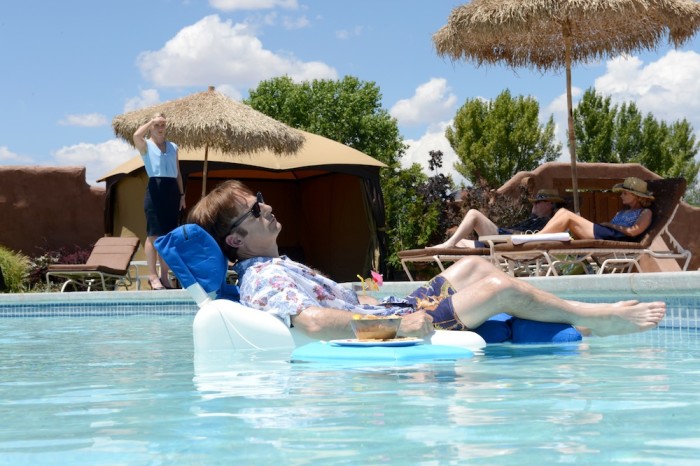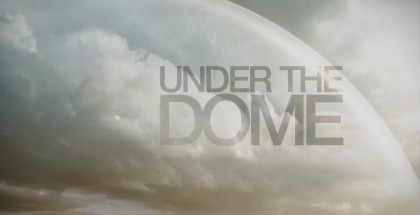Netflix UK review: Better Call Saul Season 2, Episode 1
Review Overview
Right door
8Wrong door
8Middle ground
8David Farnor | On 16, Feb 2016
“People tell me how they see me. It’s not as a lawyer.”
It’s been a whole year since we last caught up with Jimmy McGill (Bob Odenkirk), the scheming con man who will one day become Saul Goodman, the scheming con man-lawyer. The first season of Breaking Bad’s spin-off was an uneven affair, held together by its leading man. The premiere of Season 2 reveals a more confident show, one that has a stronger understanding of what it is – and what its leading man isn’t.
We join Jimmy as he continues trying to decide between the good path and the bad path – a dilemma not unlike one Walter White. Unlike Breaking Bad, though, we already know where Jimmy is going to end up. In fact, we’re shown it once more, in a black-and-white prologue set in everyone’s favourite Omaha Cinnabon. Here, Saul cuts a depressing shambles of a figure, all overgrown moustache, bald patch and gazing at the ground. (“Would you like this person to serve you?” asks a mirror in the staff changing room. He doesn’t look.) Warm cinnamon pastries never seemed so sad.
Writers Vince Gilligan and Peter Gould seize that melancholy and mine it for all the humour they can get, an approach befitting our showman shyster, who is one step away from doing jazz hands in any scenario. Season 1 spent a long time flip-flopping over Jimmy’s moral stance and emotional angst – something that left the show relying too much upon his disapproving older brother, Chuck (Michael McKean), to try and drive up the sympathy stakes. Season 2, following Chuck’s betrayal, kicks McKean to the curb for the opening hour – a decision that proves hugely effective. Now, we get Jimmy on his own terms, and the show is happy to stay right there: on the fence.
The result is a impressively consistent study of inconsistency – and a perfect chance for Odenkirk to dazzle once more. The actor is quietly extraordinary when in action as McGill, delivering a performance of minute details: his hair, when meeting a potential employer, is smoothed down in a way that looks both tidy and wholly unnatural; his hands, when trying to confess his feelings for Kim (Rhea Seehorn), flap about like diseased seagulls; his grin, reserved for victories and victims, is mostly seen for the latter.
As he shambles about Albuquerque, it’s surprising just how much we’ve come to care for this silly man – now that he, and the show, are more comfortable in their own skins, we can finally throw our eggs into his basket. Seehorn’s straight-laced lawyer is a big part of that; what once seemed like a pipe-dream for Jimmy now seems less ridiculous, as we see just how good the couple are together. One sequence involving tequila and a stock trader is a hilarious glimpse of what might happen in an ideal future – but, of course, the morning after brings McGill back down to earth with a bump.
The guy, quite simply, has zero luck. After a whole season of that, he’s starting to snap. Compared to Kim, who appears to have everything she wants, it’s striking just how different they are: she (played with gentle conviction by Seehorn) sees the line between Jimmy and Saul, between lying and practicing the law; he, on the other hand, sees them as the same. After all, they both involve cheating, chatting marks up and getting large sums of money. What’s the difference?
Their relationship has far more heart than Jimmy and Chuck’s and provides a warm contrast to Jonathan Banks’ frosty Mike, who completes the show’s central trio – Better Call Saul is a testament to Gilligan and Gould’s ability to turn supporting roles into fascinating leads. Ehrmantraut has morals, as we saw in Season 1’s standout episode, but his own history has led him to switch them off when working: on the job, he’s a stone-cold professional, with no second thoughts. Even when given the option to help protect someone, but not on his terms, he walks away, much like the cash he and Saul encountered last season. Jimmy, though, does care – both about getting the cash and about other people (well, Kim). As she tries to nudge McGill in the right direction, he tells himself he’s done with being honest and that he’s going to live the high life, but there’s no winning there either: that freedom he craves is as pathetic and depressing as the other option, more akin to a bored sigh than a whoop of success.
There’s no sudden switch to turn Jimmy into Saul – doing that would take us right up to Breaking Bad – but embracing that breathing space is what makes this series so effective. As the second season starts, Better Call Saul is confident enough to shuffle calmly around the grey area between the two and take its lead not from Breaking Bad, but from Jimmy himself. He’s a man perpetually conflicted between right and wrong and the show revels in that ambiguity; the unevenness that once was a problem has become its greatest strength. The episode’s black-and-white opening finds Saul trapped between two doors: one, rigged with an alarm and forbidden to be opened; the other, locked from the outside. The younger Jimmy, we sense, will soon start kicking through those barriers himself; an exciting prospect, given how good (and bad) Odenkirk’s grifter is when he’s righteously angry. But the retired con man-lawyer, with his weary moustache, merely sits and waits in the middle. Even at the end of it all, he’s still hoping to catch a break.
Better Call Saul Season 2 is available on Netflix UK, as part of an £9.99 monthly subscription. New episodes arrive every Tuesday at 8.01am.





















